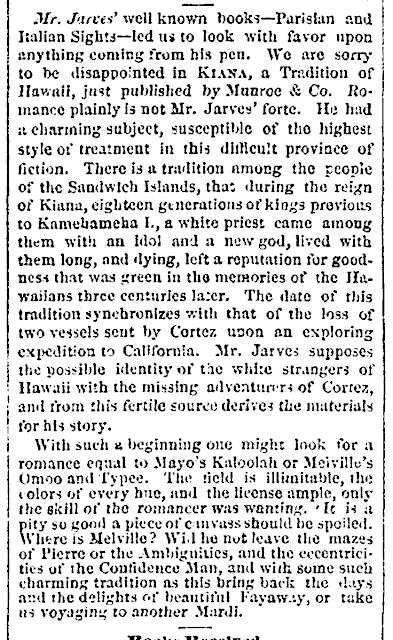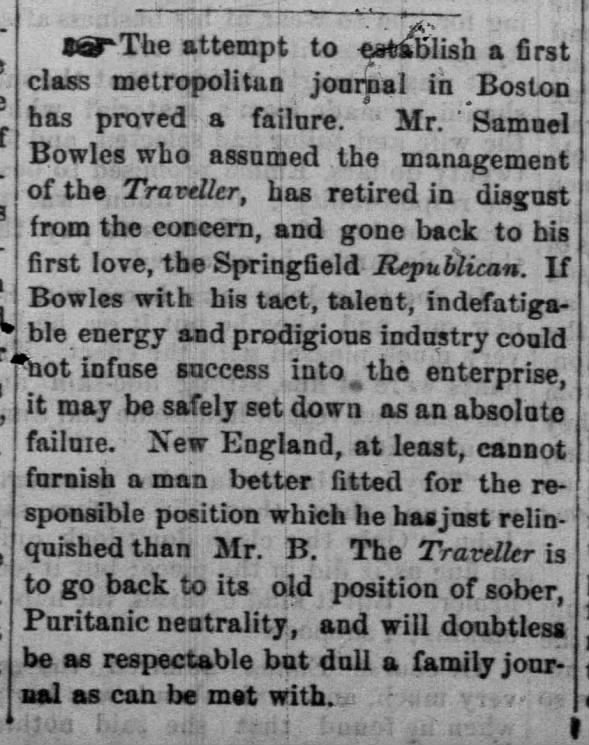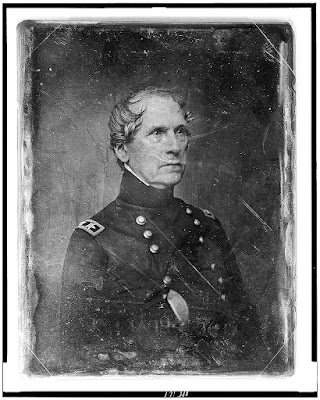Here below is my transcription of Augusta Melville's letter to her brother Allan Melville in New York City, written on May 16, 1851 at the Van Rensselaer Manor House
in Albany, New York. As she informs Allan, Augusta had been there for at least two weeks ("a long fortnight"), visiting and
socializing with Albany relatives--2nd cousin Catherine "Kate" Van
Rensselaer, for one, a younger sister of Augusta's close friend Cornelia
"Nilly" Van Rensselaer Thayer.
Augusta's own home at the time was her brother Herman Melville's Arrowhead
farm in Berkshire County, Massachusetts. While she was away in the month of May 1851, Herman was
busy doing or supervising repairs and improvements to the farmhouse.
"The whole place will have been so much improved by the time of my return, that I expect hardly to recognize it."
Before
she left to rejuvenate in Albany, Augusta had been working hard as Herman's copyist, tasked with turning her brother's
scribblings into a legible manuscript for the printer. To Allan, in
passing, Augusta made what has to be the earliest comment on record by any reader of Moby-Dick, five months in advance of its publication in England as The Whale:
"So you had a flying visit from Herman? When does he make the longer one?
That book of his, will create a great interest, I think. It is very
fine. By the way, have you seen Willis' Hurry-Graphs?"
Believing Herman's new book to be nearly finished and ready for the press, Augusta predicted it would "create a great interest." After praising the Whale in manuscript as "very fine," Augusta went on to commend Hurry-Graphs; Or, Sketches of Scenery, Celebrities and Society by Nathaniel Parker Willis (where "Herman Melville, with his cigar and his Spanish eyes" is mentioned at the start of the chapter on Lieut. Wise, Author of Los Gringos); and in a postscript, Jane Bouverie by Catherine Sinclair.
Augusta
Melville's letter to Allan Melville on May 16, 1851 is now at
Arrowhead, donated by Anna Waller Morewood (1905-1994). Hershel Parker quoted it for the
first time in "New Melville Documents and Sub-Intentioned Death,"
Chapter 17 in Suicidology: Essays in Honor of Edwin Shneidman (Jason Aronson Inc., 1993) pages 289-298 at 291. Generous excerpts are given in Parker's Herman Melville: A Biography Volume 1, 1819-1851 (Johns Hopkins University Press, 1996) on pages 840
and 867. However, a complete transcription has not been published
before now.
Dave Laczak, senior technician with the Local History Department
of the Berkshire Athenaeum, helpfully directed me to the present
location of Augusta's letter. At the Berkshire County Historical Society
at Herman Melville's Arrowhead, assistance
with obtaining scanned images was kindly provided by Lesley Herzberg,
Executive Director; and Erin Hunt, Curator. I am sincerely grateful for
their guidance. Mistakes are
all mine.
Manor House
May 16th 1851
My dearest brother,
The letter you promised, has not yet made its appearance — & here I have been a long fortnight. But it is not too late yet, do not imagine that I have given up now all thoughts of receiving it, by no manner of means. I shall continue to expect it by each morning's mail, just as I have been doing ever since I came. I have only heard from home once, but I hope to have a letter tomorrow. They are all so busy there, that I suppose they dont feel as if they could spare the time to write often. The whole place will have been so much improved by the time of my return, that I expect hardly to recognize it. No doubt you have had letters since the date of mine & know just how far they have progressed. How I long to have everything in beautiful order, & you & Sophia & the children there enjoying the country air. Give my very warmest love to Sophia, & try to impress upon her mind the fact, that the receipt of a few lines from her, would afford me the highest satisfaction. I hope to hear that she feels stronger, & is no longer troubled with that wearisome pain in the back. Those arms, I trust, measure a little more in circumference, & those poor wrists are not quite so thin. I can imagine what a delicately slender appearance they present draped in the fashionable undersleeve. How much I should like to see that little Florence, & my darling little Maria. They will have grown almost out of my remembrance. Kisses by the dozen for them both; & a speedy transportation of them to Arrowhead.
[page 2:]
And now I must try to gather all the Albany news for you, & tell you something of my visit thus far. The first week I was here, the weather was exceedingly unpleasant. Nothing but a succession of violent showers, so we were kept almost prisoners, I believe I was only out of the house twice. For the past six or seven days, however, it has been very delightful, just cool enough to be pleasant with the exception of one sultry day, when the thermometer stood at 80. We have been out driving a good deal, & had a good deal of company to dinner. I have only passed one day out, and that was at Aunt Susan's, yesterday. They are all very polite there — Uncle, excessively so. What will you say to his calling to see me with Aunt Susan last week, & then to his inviting me to drive with him to Troy to call upon General & Mrs Wool, to whom, it would give him much pleasure to introduce me! —he said.
Then too, they have really pressed me to make them a visit, when my visit here is over. This however I have declined doing, as I shall then be anxious to return home. Last evening, he again showered upon me his civilities, & ended by taking me to a grand Vocal & Instrumental Concert, which was given at Van Vechten Hall. Aunt Susan did not accompany us, as she is in mourning for Mr. Westerlo. By the way Mrs Westerlo & her daughters have almost determined upon removing to New York. Their annuity of $1500 a year died with Mr Westerlo, & the Van Rensselaer heirs have given them the house they occupy, which as it is upon such a valuable lot, they can dispose of to advantage. Some say it is will bring $16000; some $20,000. Did you know that Uncle had sold Grandmamma's house to Mr Delavan? Aunt Susan told me of it this morning, & said that he had received $13000 for it. Speaking of property makes me think of what an advantageous sale, Mr Van Rensselaer has lately made. They are to introduce the Tivoli water into the city, for which privilege, & the necessary
[page 3:]
land for the Reservoirs, the city have paid him 150 000 dollars. That has enabled him to pay up those heavy debts, & remove many of his anxieties arising from the anti-rent troubles. Then too, he has been engaged for some time in filling up the his low lands bordering on the river & converting them into lumber yards & docks — which rent to such advantage, that this past year, they brought him in $30,000. All these little particulars, I have treasured up in my memory, thinking they might interest you. Such things generally pass immediately out of my mind. They are making preparations to alter the patroon's bridge, so as to place it more on a direct line with the Troy road.—
A few days since, Kate Van Rensselaer & I took a long drive up on the new Albany-plank-road, went as far as Newtonville. We were with Mr and Mrs Sherman, in their beautiful open English Carriage. It was very pleasant. By the way, do you know that Mr Sherman has accepted the cashiership of a new private Bank about to be offered in New York, & is to lease his beautiful place this fall? To think of that, now, just when he has everything in such beautiful order. We were up there a few days ago to see a very magnificent Magnolia which was in bloom — over two hundred and fifty flowers upon it at one time, & as I walked round the grounds, I could not help thinking what a pity it was. Mr Duncan, of Providence, is to give the capital of this bank, $2000,000, & Mr Sherman puts in $100,000.
We have been to see those great curiosities, the Aztec children. At first sight they impressed me very disagreeably. But, after a closer observation I found that there was nothing really repulsive about them. They are well called Lilliputians. They are said to have been brought from Central America, & with truth, I believe, for in profile they strikingly remind you of the illustrations in "Stevens Central America." They present the same facial angle, & no forehead. Mrs Trotter was in New York, last week for a couple of days - she went down to see Mrs Matthew Trotter who had just lost a child. She saw Aunt Mary in Brooklyn, & seems to be much affected by the great alteration in her appearance. She tells me that she
[page 4:]
has almost entirely lost the use of her right hand (I never knew that,) & is very much depressed. You must go there very soon then & let us know how she is. Uncle Peter, did not even know that she had been ill, until the day I passed there. Henry & Kitty have both grown very much — Henry wants only an inch or two of Uncle's heighth. By the way, they have lost one of their neighbors—Judge Bronson who has removed to New York. Mr Thayer has just been passing a couple of days with us, he brought me an invitation to return with him to Boston, & make Cornelia a visit — but I shall defer that to some other time. We are expecting Justine home from Baltimore this afternoon. Her father went for her on Monday. She has been suffering from a most alarming cough, & the physicians recommended her taking a little trip to the South — so she availed herself of that opportunity to visit Margaret in her new home. Bayard returns from Scotland some time next month. He has finished at the University, & is now to go in business. They speak of putting him with Mr Thayer.
They are all well at the Van Vechtens. Mr Van Vechten's health is so much improved that he is able to take a drive every day, & attends church. The use of his hand however, is still denied him. There is some talk of Cuyler's going to Europe. He is more of an exquisite than ever. I met him at the Concert, the other evening. Judge Hurlbut, is passing a fortnight at his place in the country. Kate misses him very much. He has given up all business & is now a gentleman of leisure. Mr Van Vechten's attack was viewed, I believe, as a warning. Cousin Hetty Ten Eycke has given up her house, & removed, with her furniture to Whitehall, where she is to live. Leonard is there — but the other boys are scattered. Anthony boards at the Mansion House, & practices law. But everyone says he is worth nothing. Jacob is in California, Clinton in Mr Corning's store, & Cuyler at Paige's Furnace.
 |
Detail, page 4 of 4. Augusta Melville, letter to Allan Melville, 16 May 1851.
Courtesy of the Berkshire County Historical Society, Pittsfield, MA |
So you had a flying visit from Herman? When does he make the longer one? That book of his, will create a great interest, I think. It is very fine. By the way, have you seen Willis' Hurry-Graphs? Mr Sherman, says there is a capital portraiture of Wise in it? He has been visiting him. Next month, he expects a visit from another author, Mr Mitchell of the "Reveries of a Bachelor." Ask Sophia to read them, they are so interesting. Did you see by the papers that Mrs Harmanus Bleecker is married to Mr Coster at Amsterdam. She is expected back in one of the early steamers. How is Mrs Charles. Tell her not to despair of receiving an answer to her letter. I will write before I leave Albany. I wrote Mary Blatchford a few days since. Now show a grateful heart & answer this voluminous letter by as voluminous a one. lovingly your sister.
[P.S. top of page 1:]
My love to Mrs Thurston & every member of the family. Remember me to both of the Elizas. Has Sophia, read "Jane Bouverie" — It is beautifully written. Miss Sinclair is the author. Remember me kindly to Mr & Mrs Duyckinck. Mr J. R. wanted me to go with him to Baltimore. How pleasant it must be in New York now. Tell Sophia Mrs Bigelow (Miss Poultney) has a little son, a month old. But perhaps she knows it. Now I believe I have told you everything that I can think of. Cousin Maggie Wynkoop sent her love. The Taylors asked about you all.
* * *
Related posts:














